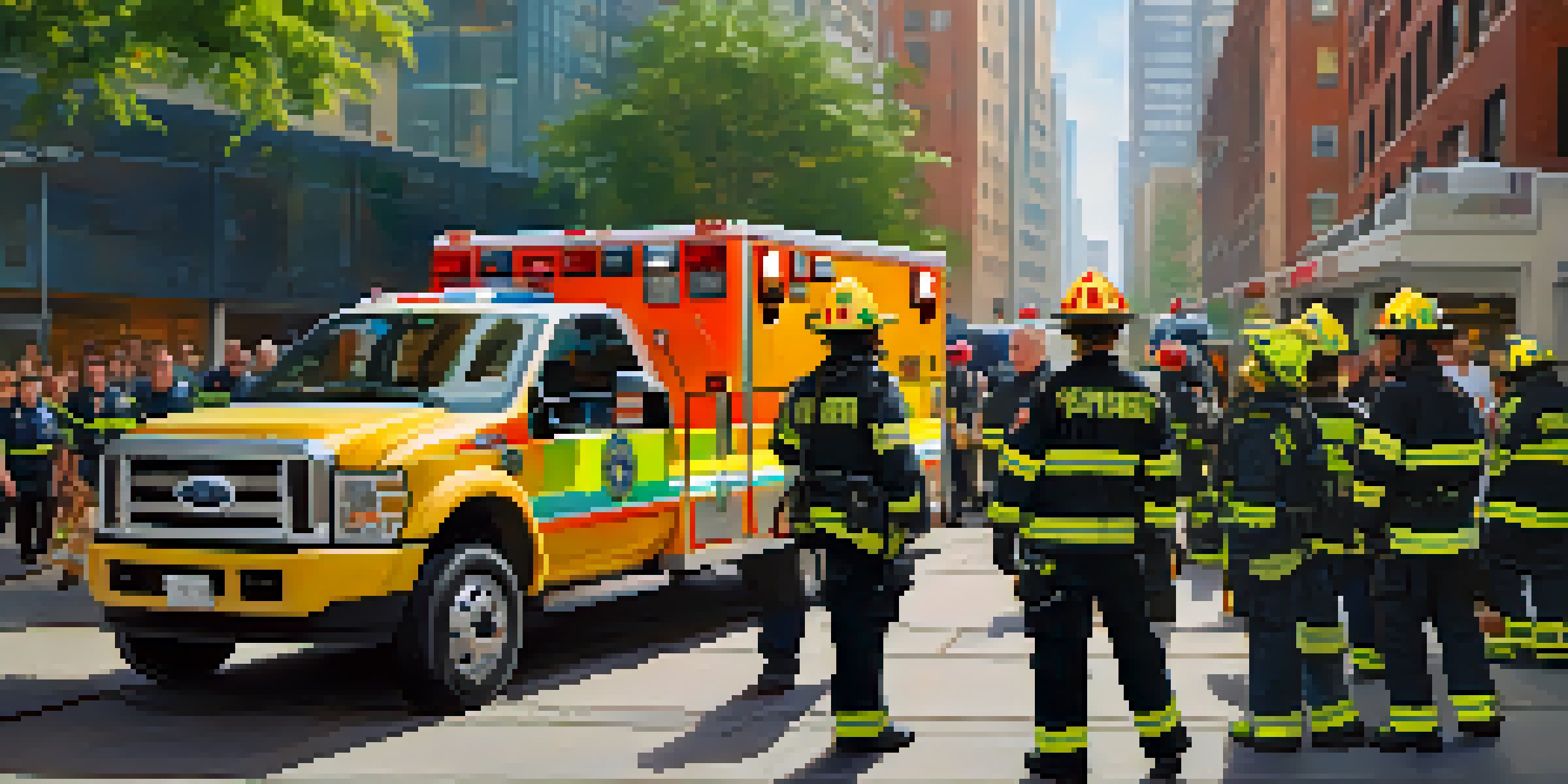Legal Considerations for Emergency Responders and Marijuana

Understanding Marijuana Legality in Different States
Marijuana laws vary significantly across the United States, creating a complex landscape for emergency responders. In states where marijuana is legal, responders must understand the nuances of state laws versus federal regulations. It's essential to be aware of local ordinances and how they might affect emergency response protocols.
The law is not a static thing, but a dynamic force that reflects the changing values and needs of society.
For instance, in states with medical marijuana laws, responders might encounter patients using cannabis for legitimate health reasons. This can complicate situations, especially if responders are unsure about a patient’s legal status regarding marijuana use. Clear guidelines can help responders navigate these scenarios without overstepping legal boundaries.
Additionally, as states continue to change their marijuana laws, it’s crucial for emergency responders to stay updated. Regular training on legal updates can ensure that responders are prepared to handle the intricacies of marijuana use in their communities.
Potential Liability Issues for Emergency Responders
Emergency responders face potential liability when responding to situations involving marijuana. For example, if a responder administers aid to a patient under the influence, they must be cautious about how they handle the situation to avoid claims of negligence. Understanding the legal implications of interacting with individuals using marijuana is vital.

Moreover, if a responder mistakenly assumes that a person is impaired due to marijuana use, it could lead to wrongful actions or decisions. This highlights the importance of thorough training and education on recognizing signs of impairment versus legal use. Responders should be equipped with knowledge to differentiate between medical use and misuse.
Understanding Marijuana Laws
Emergency responders must navigate varying state laws on marijuana to ensure compliance and effective care.
Responders should also be aware of their department’s policies on marijuana-related incidents. Clear policies can protect both responders and the department from legal repercussions, ensuring that everyone understands their rights and responsibilities when dealing with marijuana-related emergencies.
Impact on Emergency Response Protocols
The presence of marijuana can significantly impact emergency response protocols. For instance, responders may need to adjust their assessment strategies when dealing with individuals who have consumed cannabis. This adjustment is vital to ensure accurate evaluations and appropriate medical responses.
Emergency responders need to be equipped with the knowledge and training to navigate the complex landscape of marijuana legality.
Additionally, the interaction between marijuana and other substances often complicates medical assessments. Understanding the effects of marijuana in conjunction with other drugs can help responders make informed decisions about treatment options. This knowledge can be crucial in emergency situations where time is of the essence.
Furthermore, responders must be prepared for potential stigma and bias when dealing with marijuana-related emergencies. Training on cultural competence and sensitivity can help ensure that all patients receive respectful and effective care, regardless of their cannabis use.
Testing and Impairment Issues
Testing for marijuana impairment presents unique challenges for emergency responders. Unlike alcohol, which has established testing methods, marijuana testing can be less straightforward due to varying detection windows. This inconsistency can lead to confusion when determining a person's level of impairment during an emergency.
Additionally, the lack of standardized testing for marijuana impairment makes it difficult for responders to assess whether someone is fit to drive or make decisions. Responders should be aware of the limitations of current testing methods and how they impact their assessment of an individual's condition. This knowledge is critical for making informed decisions.
Liability and Training Needs
Responders face potential liability issues and require thorough training to differentiate between medical use and impairment.
As a result, emergency responders must rely on their training and judgment to evaluate impairment. Developing clear protocols for assessing marijuana use can help responders navigate these situations more effectively, ensuring that they uphold safety standards while making informed decisions.
Handling Medical Emergencies Involving Marijuana
When responding to medical emergencies involving marijuana, it’s crucial for responders to approach each situation with care. Understanding the medical effects of marijuana can aid responders in providing appropriate care. For example, recognizing symptoms of anxiety or panic attacks, which can occur after cannabis use, can help responders offer effective support.
Moreover, some patients may experience adverse reactions to cannabis, leading to medical emergencies. Responders should be equipped to handle such situations and provide necessary interventions. Training in recognizing and treating cannabis-related health issues can ensure that responders are prepared for these scenarios.
Finally, communication with patients about their cannabis use is essential. Encouraging open discussions can help responders gather critical information, leading to better patient outcomes. This transparency can also help demystify cannabis use and promote informed care.
Public Perception and Emergency Responders’ Roles
The public's perception of marijuana and its legalization can significantly impact how emergency responders are viewed. As societal attitudes shift, responders may find themselves at the center of debates surrounding cannabis use. Understanding public sentiment can help responders navigate these conversations more effectively.
Additionally, emergency responders can play a role in educating the community about safe marijuana use and the associated risks. By engaging with the community, responders can build trust and foster a better understanding of their responsibilities. This proactive approach can enhance the relationship between responders and the public.
Future Trends in Legislation
As marijuana laws evolve, responders must stay informed and prepared for new challenges in emergency situations.
Furthermore, addressing misconceptions about marijuana can reduce stigma and improve interactions between responders and individuals who use cannabis. Open dialogue can lead to better cooperation during emergencies, ultimately improving patient care and community relations.
Future Trends in Marijuana Legislation and Emergency Response
As marijuana legislation continues to evolve, emergency responders must stay ahead of the curve. Anticipating future trends in legalization and regulation can help responders prepare for the challenges that may arise. For instance, as more states consider recreational use, responders may encounter new scenarios requiring tailored responses.
Moreover, advancements in research around cannabis and its effects on health can inform how responders approach marijuana-related incidents. Staying informed about the latest findings can enhance training programs and improve emergency response strategies. This proactive approach can ensure that responders are equipped to handle emerging challenges effectively.

Lastly, collaboration between lawmakers and emergency services can lead to better policies that consider the unique needs of responders. By working together, both parties can create a framework that ensures safety while respecting individual rights, ultimately leading to more effective emergency response systems.